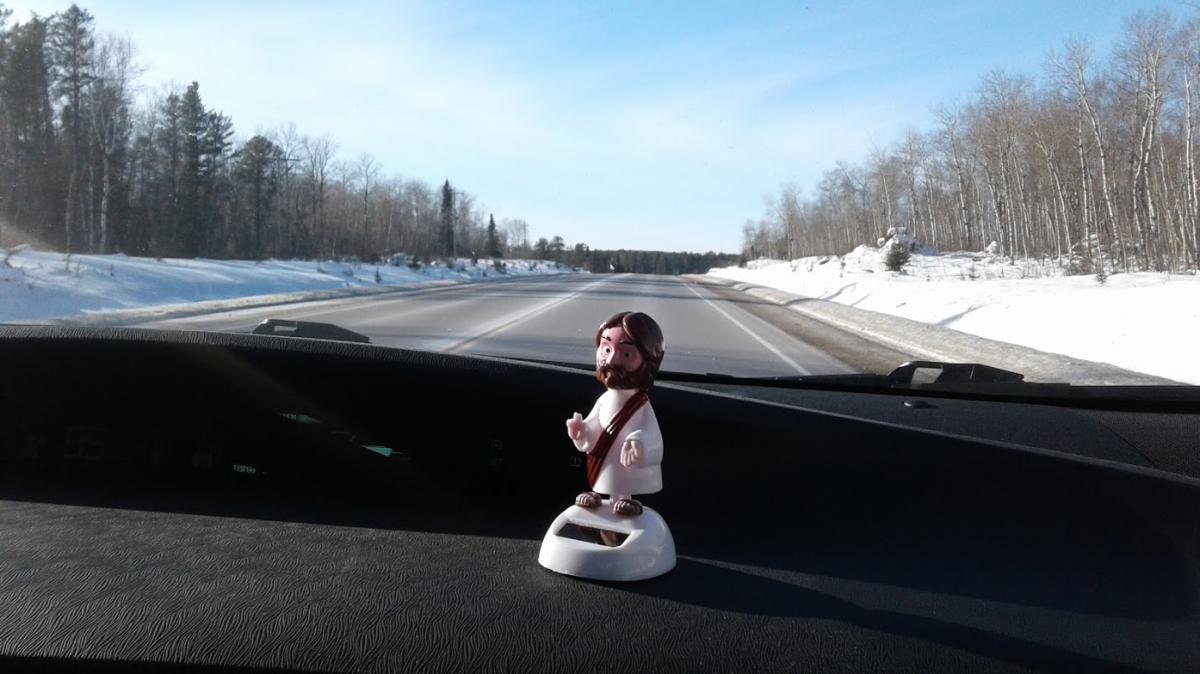Sermon - Feb 19, 2023 Just Jesus

Just Jesus
What is there to say? Jesus and friend’s go up the mountain. Jesus shines more brightly than the noonday sun. God speaks. The disciples fall to the ground in terror. Welcome to our annual Transfiguration Sunday puzzle.
I’ve used parts of this morning’s reading at two separate session meetings this week… and said essentially the same thing in both cases. I’ve probably preached on this particular incident – as related by three different Gospels – twenty times now. What is there to say?
Do we really need bright lights and heavenly voices to remind us that Jesus is something special? Is this mini revelation enough to take the edge off of the things Jesus has just said about how challeging it is to follow him? And why bother with this when the very next sentence suggests Jesus orders Peter, James and John to stay silent “until the son of man is raised from the dead.”?
When I hear this story now, all of the usual questions go through my mind: what does it tell us about God? What can we learn about ourselves? How in the world does this incident feed our faith? We are well along on the “Easter” side of Jesus’ story. We’ve read to the end – we know how it goes. Jesus is risen and death is ‘defeated.’ How is this moment on the mountain going to be any more influential that the empty tomb?
And I’m bold to say that stories like this have very little to teach us about God, actually. God’s voice is heard only rarely, and when it’s heard, people fall to the ground in fear, or wonder what the rumbling is…
So what if Jesus ‘shines’ and God ‘speaks.’ Perhaps this is a cautionary tale; about us.
++++++++
Three witnesses climb the mountain. The ‘inner circle’ if you will. Three men who are being prepared for something none of them can anticipate – leadership in a new movement of faithfulness. And the gut reaction – upon sharing this vision on the mountain – is to make a shrine.
Yes – Moses and Elijah are big news. And sure, Peter probably realized that this was a vision – not some new reality. The text suggests that he was babbling – he was trying to turn a moment of awe and wonder into something tangible and recognizable:
‘Lord, it is good for us to be here; if you wish, I will make three dwellings here, one for you, one for Moses, and one for Elijah.’
In other words – this is strange, but it speaks of our tradition. Let’s reinforce that – build something solid and recognizable. Let’s hang on to this moment; bring the past forward and maybe the present – and the future - will be a little less frightening…
Peter speaks for all of us, I think.
When we are confronted with moments of awe and wonder; when God moves among us and shines light on something spectacular and new – something different that we are used to – we want to freeze the moment or turn back the clock. Let’s relate this future possibility to some past glory. Maybe then we can navigate without fear…
But the past is a building block – a cornerstone, rather than an anchor. (Cornerstones are the start of something – an anchor keeps you stable and in place) Jesus doesn’t dismiss Moses and Elijah – and he doesn’t declare them surplus goods –Jesus merely reminds the terrified disciples of his presence, and leads them back down the mountain.
So, as the cloud clears and the vision fades and the voice of God fades into memory, the disciples are left with Jesus. By himself. Alone.
And those who will tell you that they are tired of conflict and controversy – tired of preachers like me trying to weave faith into the current state of human affairs – those who say ‘forget all that theology and just give us Jesus!’ here think they are justified…and they are. But what this text would suggest is that if we want ‘just Jesus,’ what we get is everything that ever came before.
Every interaction – every experience of the divine. Every grouchy prophet – every controversial ‘law.’ Jesus stands as the focal point for all that God has tried – is trying – will try – to say to humanity. So, building a shrine and honouring Jesus (and Moses – and Elijah) as some kind of personal tonic for all that is uncertain and terrifying about the future is not really an option. Jesus calls us into that uncertainty with the wisdom of the ages at his disposal.
Jesus turns his understanding of the past – his knowledge of the law and prophets – into a platform for navigating the present and transforming the future. Jesus never suggests that they should retreat to the good old days of wandering the seaside or listening to John the Baptist. He is moving forward to a confrontation with those who cannot see past their history – who are anchored to the ‘good old days.’ People for whom messiah was nothing more than a conquering, warrior king who would lead Israel to it’s independence.
But Messiah, it turns out, is much more than that. And it is Messiah who calls us to move forward with an awareness – even a tender affection – for the past, but with our eyes wide open to God’s infinite possibilities for the future.
A future that includes trials and troubles. A future that will require all our understanding, and wisdom to navigate. A future ruled by justice and compassion; mercy and grace.
Our history is littered with heroes – examples of those whom we thought had the answers. Looking to the future, it’s just Jesus.
 St. John's
St. John's




